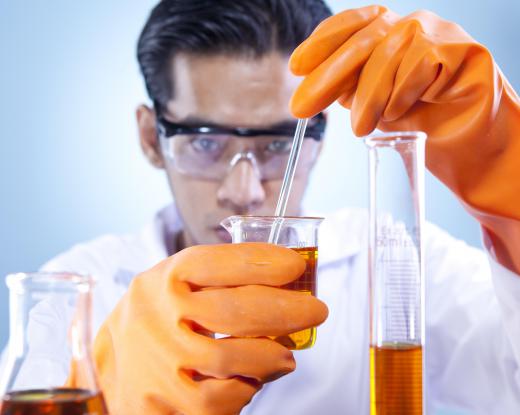What Is a Chemical Process?
A chemical process is any laboratory or industrial activity where products are chemically reacted with each other to form new products. The reactions change the structure of the product molecules, rather than adding them together in a mixing process. Mixtures can result from these activities, but a chemical change has occurred in one or more of the reacted materials.
Process designs often involve building larger molecules from smaller molecules found in raw materials. Some reactions can break larger molecules and rearrange them in different ways to produce a final product. Multiple reactions may be required to produce a desired molecule, and can include additional raw materials or changes in temperature or pressure to cause different products to form. A process may be a single reaction step, or an industrial operation creating finished chemical products on a large scale.

Chemicals are first produced in laboratory-scale equipment, both to confirm the necessary steps and to fine-tune the reaction temperatures and pressures often required for the reactions to occur. Many industrial chemical processes occur at high temperatures and/or pressures, but less often, the reactions can occur at very low pressures or in a vacuum, or at very low temperatures.
Catalysts may be used to aid the chemical reaction when designing a chemical process. These are products that speed up or accelerate the reaction, make more of the desired final product versus other byproducts, or in some cases allow the reactions to occur at lower temperatures or pressures to reduce costs. High-pressure or temperature reaction vessels can be expensive to manufacture, so a catalyst can be important when designing chemical plants.
Testing in pilot plant, or small scale, operations may be the next step in process design. Reaction times, temperatures and pressures must be reviewed and optimized to produce the correct chemicals and reduce waste materials. Products must be separated and purified in additional steps, and additional reactions may be needed before a final product is made. Waste materials need to be determined, and finding ways to neutralize or dispose them to minimize environmental issues. Pilot plant testing is important, because some laboratory tests do not operate correctly when run in larger equipment, and changes may be needed in the design before a full-scale plant is built.
A full-scale industrial chemical process can take years to build at great expense, so care is taken to verify all equipment and process control requirements before construction begins. Chemical plants require raw materials supply by train or truck, using tanks for liquids, cylinders or high-pressure vessels for gases, and warehouse space for bags or drums. Reaction tanks or towers are needed for producing the raw or unpurified finished products, and all piping, electrical and instrumentation must be designed to connect all parts of the process. Chemical process designs include methods to separate and recycle unused raw materials back to the front of the process to reduce waste and operating costs.
When the finished products have been purified and separated from the chemical process stream, storage may be needed until they are shipped to customers. This can include additional tanks for liquids, cylinders for gases, and warehousing for drums or bags, and some products may have specific temperatures or storage conditions to maintain quality and avoid safety issues. A manufacturer may have trucks or tank cars available to ship bulk quantities to customers, and these fleets may be owned or leased.
Each reaction in a chemical process is one step, and many may be combined in a complex chain of events called a chemical plant. Chemical process engineers and plant designers carefully consider the interaction of all steps to create an efficient operation. Product quality, energy efficiency and waste minimization are all carefully considered in process design, and are critical to produce a profitable chemical operation.
AS FEATURED ON:
AS FEATURED ON:











Discuss this Article
Post your comments